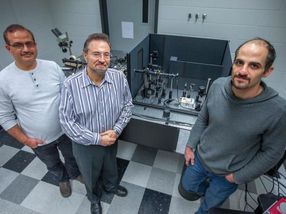Frost & Sullivan: Escalating Demand for Novel and Effective Therapeutic Approaches Underlines Growing Appeal of Peptides
Strategic Analysis of the Therapeutic Peptides Market in Europe
With a 30 per cent revenue share, Europe trails the United States as the second largest regional market for therapeutic peptides. The rising need for new therapeutic approaches combined with the potential of peptides as active pharmaceutical ingredients for effective drug formulation is contributing to rapid market development. Manufacturers will need, however, to demonstrate scale-up ability if they are to leverage emerging growth opportunities.
In 2003, Europe contributed an estimated USD 300.0 million to the USD 1.0 billion global therapeutic peptides market. Growing at a compound annual growth rate of 10.5 per cent over the 2003-2010 period, the region is poised to generate USD 605.0 million in 2010. With a 33 per cent share in 2003, Germany led the European therapeutic peptides market closely followed by the United Kingdom with a 30 per cent share. Other important markets included Scandinavia, France, Italy and Spain.
Motivated by the development of novel delivery techniques, innovative manufacturing technologies and vigorous R&D activities, many manufacturing, pharmaceutical and biotechnology companies have entered the market. Advances in genomics and proteomics have boosted demand for small peptide and peptidomimetic drugs even as human genome sequencing has provided further impetus to peptide research.
"At the same time, the development of large synthetic and biological peptide libraries in combination with high-throughput processes has facilitated the research and development for clinical application of peptides and this has enhanced the prospects of obtaining new drug candidates," notes Frost & Sullivan Research Analyst Himanshu Parmar.
The persistent need for novel therapies in infectious, cardiovascular, oncology, metabolic disease, central nervous system (CNS) disorders and other therapeutic categories is providing a financial spur for the development of new peptide therapies.
The approval of new peptide-based drug products such as Fuzeon is stirring interest among many pharmaceutical companies with the entry of leading pharmaceuticals companies such as Roche and Merck being seen as a vindication of the market's strong growth potential.
Globally, more than 40 peptide-based products are commercially available with 6 in the registration process. In Europe, about four to six peptide based products are in the market, with 100 in the clinical stage and 150 in advanced pre-clinical phases. Recently approved new chemical entities and generics are set to expand the market in coming years.
Peptides used in drug formulation and clinical trials account for nearly 93 per cent of the European therapeutic peptides market with R&D comprising the remainder. Almost 60 per cent of the market comprises peptide-based therapeutics for the oncology segment followed by cardiovascular, infection and metabolic therapeutics.
Despite the significant progress that has been made, technological challenges such as delivery problems associated with peptide drugs, their instability in vivo and short half-life remain critical challenges. Costly and inefficient large-scale manufacturing and purification processes are, moreover, hampering market growth.
Optimising peptide delivery inside cells, tissue organs or body, will require increased R&D efforts. Collaborative ventures with the larger research community and biotechnology companies will be essential to implementing new and effective peptide delivery technologies, developing synthetic peptides with increased stability and half life and realising peptidomimetic molecules that duplicate the structural and functional properties of biologically active peptides.
Cost-competitive, bulk manufacturing strategies are being identified as key to sustained market expansion. "Developing modern and sophisticated formulation techniques, efficient and cost-effective scale up process and cutting-edge purification and separation methods with low cost and high throughput are fundamental to achieving high quality, economical products for commercial purposes," notes Mr. Parmar.
Bachem is currently the leading manufacturer in the European therapeutic peptides market followed by UCB, PolyPeptide Laboratories, Peptisyntha and Diosynth. All European manufactures confront escalating price sensitivity, competition and eroding prices. Intensifying competition from low-cost Asian manufacturers by 2006-2007 is expected to trigger further price attrition.
"While manufacturers unable to compete on pricing will not be successful, they will also need to focus on competitive criteria such as quality, flexibility, reliability and implementation timeline," cautions Mr. Parmar. "Additional strategies could include investing in process improvements, building manufacturing plants in low-cost areas, improving product and service portfolios to build customer loyalty and entering into strategic alliances with manufacturers and pharmaceutical companies."
Moreover, while manufactures could adopt a 'one-stop shop' strategy and develop a complete portfolio of therapeutic peptide products, others could specialise by concentrating on a niche product area.



















































